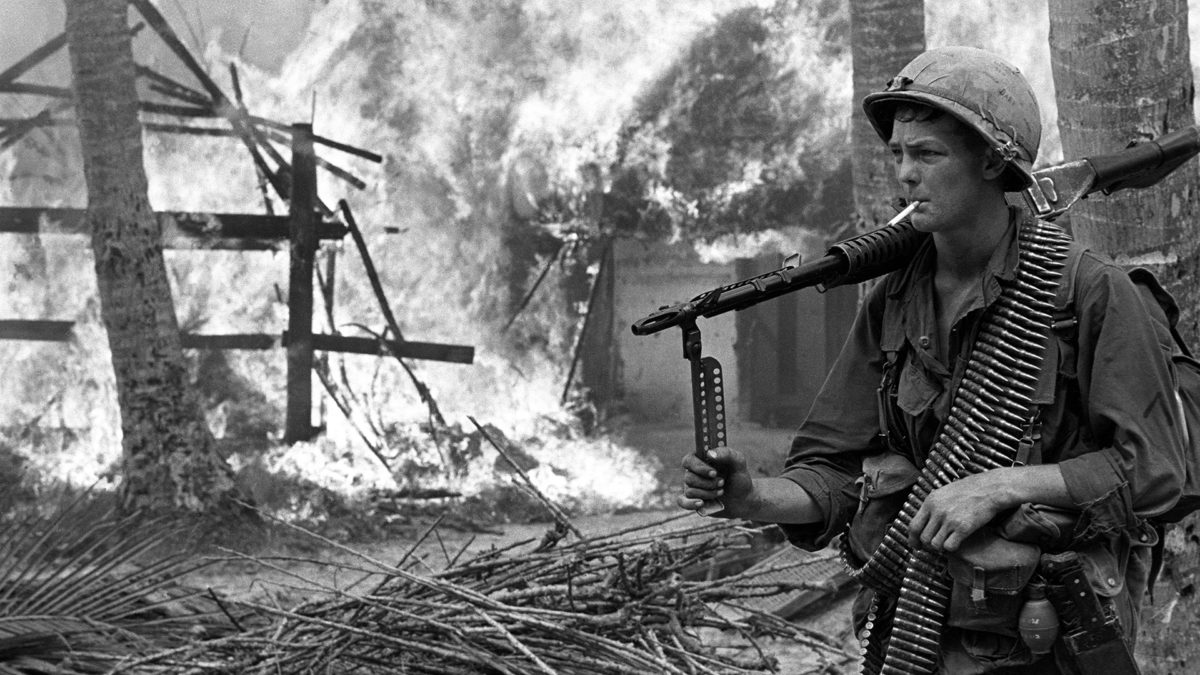(This is the seventeenth entry in The Modern Library Nonfiction Challenge, an ambitious project to read and write about the Modern Library Nonfiction books from #100 to #1. There is also The Modern Library Reading Challenge, a fiction-based counterpart to this list. Previous entry: West with the Night.)
Young scrappy soldiers came to walk the villages and the jungles and the ricepaddies from all hopeful parts of America, itching to step into boots that matched the size and the bravery of their heroic fathers. They hungered to prove their manhood and their patriotism even as their spirits dwindled and their moral core dissipated as it became common knowledge that Vietnam was an unwinnable war. They came home in dishonor and disgrace, losers who had sacrificed their bodies and minds and souls in the name of failed American exceptionalism, and they were left to rot by their government and sometimes by their fellow citizens.
Much as the shellshocked men in World War I returned to their native soil facing similar indifference to their trauma and their pain, as memorably chronicled in Richard Aldington’s brutally mordant novel Death of a Hero, the men who served in Vietnam learned that the best years of their lives had been little more than a cruel joke, even when they defended napalm-soaking sorties that burned vast horrifying holes into villages and hospitals and fields and homes and schools that happened to be situated near a hopped up Huey often manned by a pilot who was losing his mind. Their collective shellshock was as commonplace as heartbreak and many dozen times more devastating. The Vietnam vets, who were all very brave and worthy of the same valor afforded the Greatest Generation (but never received their due), suffered PTSD and traumatic injuries and severe psychological damage. Every day of their lives after the war was a new battle against painful inner turmoil that spread to their families and their friends and their loved ones, stretching well beyond the poisoned polyester of the flapping American flag itself. It seemed that nobody wanted to hear their stories, much less any news about the one million civilians and Viet Cong soldiers who were slaughtered above the 17th parallel or the estimated 741,000 who died below it or the 312,000 people who died by direct order of various governments or the 273,000 Cambodians and the 62,000 Laotians.
They all died, and none of them needed to, because the conflict had escalated through the foggy hubris of war and the dogged jingoism of three U.S. Presidents and the exacting Pentagon number crunchers who believed they could will their analytical acumen into a guaranteed victory even when the truth was fudged and altered and far too frequently ignored and contemned. For all the Pentagon’s professed understanding, the imperious powers that be could not comprehend that the massive influx of American supplies would be plundered and reused by resourceful Viet Cong soldiers with a very long memory of history who learned how to take out Bell UH-1 helicopters and M-113 armored personnel carriers from the ground. They carried out the strategic hamlet program without providing basic needs to the very villagers who were supposed to be their allies. Most disastrously, the American interventionists severely underestimated the damage that the Ngo Dinh Diem regime was doing to South Vietnamese loyalty, culminating in the Buddhist Crisis of 1963, which persecuted religion in a manner shockingly similar to ongoing present-day American indignities against Muslims.
Somewhere between 1.5 million and 2.5 million people died in the Vietnam War. That’s close to the entire population of Chicago or the total population of Jamaica. It is the entire population of Nebraska. It is the combined population of Wyoming, Vermont, Washington D.C., and Alaska. It is the combined population of Iceland, Fiji, and Cyprus. It is a staggering and heartbreaking sum by any stretch of the imagination that should cause any human being to stop in his tracks and ponder how so much bloodshed could happen. Those who would blithely dismiss the study of all this as a priapic man’s game to keep close tabs on some completely insignificant item of celebrity gossip usually cannot comprehend the full scale of such unfathomable devastation and our duty to closely examine history so that such a bewildering bloodbath never happens again. And yet, even with the strong reception of Ken Burns’s recent documentary, the Vietnam War remains one of those subjects that Americans do not want to talk about, even when it epitomizes the toxic mix of Yankee Doodle Vanity, bureaucratic shortsightedness, savage masculinity, unchecked hypocrisy, credibility gaps, imperialist dishonesty, and cartoonish escalation of resources — all pernicious checkboxes that still mark American policy today.
We wouldn’t know of this American complicity without the invaluable work of reporters like Neil Sheehan and David Halberstam, who were raw and young and brash and sometimes foolhardy in their dispatches. It was undoubtedly their dogged free-wheeling approach, a fierce pursuit of journalistic truth that is unthinkable to such useless and unfathomably gullible New York Times company men like Richard Fausset and Peter Baker today, which caused Americans to ask questions of the war and that eventually led Daniel Ellsberg to release the Pentagon Papers (which Sheehan himself would later acquire for the New York Times in 1971). The quest for understanding, especially in the conflict’s early years, proved just as intoxicating to these sleep-deprived and overworked journos as it did to the soldiers who kept coming back for further tours of duty. All wondered why common sense had been so rashly and cheaply capitulated.
Sheehan and Halberstam followed in the footsteps of such famous war reporters as Francois Sully, Homer Bigart, Malcolm Browne, and Horst Faas. (William Prochnau’s book Once Upon a Distant War is an excellent and vivacious account of this period, although not without its minor liberties. A 1988 Neil Sheehan profile that Prochnau wrote for The Washington Post, offering some useful carryover material for his book, is also available online.) The two men arrived in Vietnam separately in 1962. They had both attended Harvard, but had arrived at the hallowed university through altogether different routes. Sheehan came from a working-class Irish background and lucked out with a scholarship. By the time Sheehan arrived in Saigon, he was a reformed alcoholic and a tortured man who had learned the fine art of carving extra hours out of any day, a talent he had honed while running a dairy farm as a kid. Sheehan worked for the penny-pinching UPI wire service and, much as a contemporary journalist is expected to write, shoot and cut video, and preserve his crisp telegenic form if he wishes to hold onto his job, he was often responsible for logistics extending well beyond the writing and transmission of copy.
Halberstam was a tall and lanky man from a middle-class Jewish background, but decidedly brasher than Sheehan. His trenchant reporting of civil rights struggles in the South attracted the notice of The New York Times‘s James Reston. Halberstam was a formidable if slipshod workhorse, banging out thousands of words per day that often had to be shoehorned into coherent shape by the exasperated Times team. But Halberstam’s reporting in the Congo was strong and gallant enough to land him in Saigon.
Sheehan and Halberstam would become friends and roommates, working very long days and often falling asleep at their typewriters. They chased any source that led them to demystify the war, but they were both seduced by a man named John Paul Vann, who became the subject of Sheehan’s journalistic masterpiece, A Bright Shining Lie. Halberstam would write two books from his Vietnam experience: The Making of a Quagmire, a short and useful 1965 volume that faded into obscurity within a decade, and The Best and the Brightest, a juicy and detailed top-down account of bureaucratic blunder that Stephen Bannon even pushed onto every member of the Trump transition team in February 2017 (as reported by the New York Times‘s Marc Tracy). But Neil Sheehan, who carried on with a quieter and more methodical approach than Halberstam’s gigantic and flagrant “us vs. them” style, rightly decided that more time and considerable rumination and careful reporting was the way in. He wisely believed that John Vann was the key to understanding American involvement and the mentality behind it. The book would consume sixteen years of Sheehan’s life. And for all the anguish that Sheehan suffered through that long and painful period, we are incredibly lucky to have it.
John Vann was a wildly energetic colonel from Norfolk, Virginia who could survive on four hours of sleep and sometimes none at all. He had built a military career on the “Vann luck.” He would willfully fly aircraft through a suicidal fusillade of fire and drive down dangerous roads that were known to be mined and patrolled by the Viet Cong. He would miraculously survive. Like Robert McNamara, he was very certain of how to win the war. But unlike McNamara, Vann did not rely on problematic data, but rather the know-how of knowing people and the pragmatic logistics that he picked up from his experience in the battlefield, often talking with and distributing candy to the South Vietnamese citizens suffering under the Diem regime. It was through such gestures that Vann avoided a few attempts on his life. Vann was savvy enough to court the trust and admiration of reporters like Sheehan and Halberstam pining for a few dependable truth bombs, to the point where the reporters pooled in their resources to buy him an engraved cigarette box when Vann left Vietnam the first time. But Vann would find a way back a few years later as an Agency for International Development official. He portrayed himself as a scrappy underdog whose candid bluster had prevented him from advancing to general, whose near twenty years of service and bravery and experience had simply not been heeded. But the truth of his checkered life, carefully concealed from many who knew him, told the real story.
Sheehan is both sensitive and meticulous in telling Vann’s take. We cannot help but admire Vann’s dogged work ethic and charisma in the book’s first section, as we see Vann attempting to bring the ARVN (the Army of the Republic of Vietnam, the South Vietnamese army known to recklessly attack insurgents under Diem) together with the then comparatively diminutive American presence in an attempt to win the war. Vann hoped to train the ARVN to better fight against the guerillas, but faced indifference from Huỳnh Văn Cao, an AVRN colonel to whom Vann was appointed an adviser. Cao often liked to don the bluster of a general. We see Vann being kind to the common soldiers, whether peasants or seasoned regulars, but we also see Vann as an egomaniac willing to overstep his rank to get results. One of Vann’s guides to negotiating the tricky turmoil of Vietnam was a 1958 novel called The Ugly American, which depicted American diplomats in a fictitious nation named Sarkhan that proved incredibly arrogant towards the culture, customs, and language of the people. The book would inspire Kennedy so much that he had sent copies of the book to every American Senator. (The Peace Corps would later become a Kennedy campaign talking point turned into a reality.) Vann would take an altogether different lesson from the book in attempting to turn Cao to his side by appealing to his ego and by flattering him. But in practice, Vann’s benign puppeteering as military command could result in disaster, such as a July 20, 1962 battle in the lower delta, in which Cao resisted Vann’s efforts to load helicopters with a second reserve to prevent Viet Cong soldiers from escaping by flatly declining the request. Such stalling allowed the Viet Cong more opportunities to pluck American ordnance, transforming .50 caliber machine guns into antiaircraft weapons through tireless ingenuity.
This communicative combativeness between the Americans and the ARVN would reach its nadir with the Battle of Ab Pac, which is one of the most gripping sections of Sheehan’s book. Vann would watch helplessly from a L-19 Bird Dog surveiling the battlefield as the AVRN delayed sending troops, not knowing that the Viet Cong had intercepted radio transmissions using stolen American equipment. This allowed the Viet Cong to strike hard and accurately against task forces that were effectively separated and caught adrift, leaving them open to attack. The American Hueys disregarded Vann’s orders and were hit by the Viet Cong. Vann, whose domineering tone could be off-putting, was unable to send M-113 carriers across the canals to save the remaining soldiers and reinforce the territory. Vann, increasingly desperate and flustered by the ARVN’s recalcitrance in advancing, approached Captain Ly Tong Ba, the ARVN man holding up support who said that he refused to take Americans, and ordered Robert Bays to “shoot that rotten, cowardly son of a bitch right now and move out.” The battle became the Viet Cong’s first major victory.
By presenting the facts in this manner, Sheehan leaves us with many lingering questions. Was Vann a somewhat more informed version of American interventionist arrogance? Was American might, in Vann’s obdurate form, needed to atone for serious deficiencies from Diem and the ARVN? Even if the ARVN had permitted the Americans to have more of a commanding hand, would not the Viet Cong have eventually secured a victory comparable to Ab Pac? Even at this stage in the book, Vann remains strangely heroic and we can sympathize with his frustration. But in allowing us to vicaroiusly identify with Vann, Sheehan slyly implicates the reader in the desire to win by any means necessary.
And then Sheehan does something rather amazing in his portrait of Vann. In a section entitled “Taking on the System,” he broadens the scope to the soldiers and the command contending with Vann’s aggressiveness (while likewise exposing the hubris of civilian leadership under McNamara, along with the bomb-happy pacification strategy of Victor Krulak and the foolhardy optimism of MACV commander Paul Harkins). And we begin to see that the Vietnam quagmire, like any intense battle for victory and power, was absolutely influenced by strong and truculent personalities, which young reporters like Halberstam and Sheehan were rightfully challenging. Unable to get the top dogs to understand through meetings and communiques, Vann began to weaponize the press against Harkin’s reality distortion field — this as the Diem regime’s increasing persecution of the Buddhists revealed the vast fissures cracking into South Vietnamese unity. Sheehan begins to insert both Halberstam and himself more into the narrative. With Vann now retired from the Army, we are rightly left to wonder if he was indeed as indispensable as many believed him to be.
But then Sheehan backtracks to Vann’s past. And we begin to see that he had been living a lie. He pulled himself from an impoverished Virginian upbringing, where he was an illegitimate child raised by a wanton alcoholic mother, and married a respectable woman named Mary Jane. But while stationed as an Army officer, he cultivated a taste for underage girls and hushed up both his numerous affairs and the allegations, even persuading Mary Jane to lie for him during a court-martial for statutory rape and adultery while also training himself to pass a lie detector test. While stationed in Vietnam the second time, Vann could not control his sexual appetite. He carried on numerous affairs, devoting his attentions quite ardently with two mistresses who were half his age, one of whom had his child, and keeping the two women largely in the dark about each other for a sustained period. His predatory behavior presents itself as a bigger lie more unsettling than the Harkin-style prevarications that resulted in needless deaths.
In the end, the “Vann luck” could not hold out. His death in 1972, at least as portrayed by Sheehan, is almost anticlimactic: the result of a helicopter crashing into a series of trees. As Vietnam changed and the American presence grew with unmitigated enormity, Vann’s apparent know-how could not penetrate as an AID commander, even though Sheehan depicts Vann having many adventures.
A Bright Shining Lie isn’t just an epic history of Vietnam. It also reveals the type of conflicted and deeply flawed American personality that has traditionally been allowed to rise to the top, influencing key American decisions, for better or worse. I read the book twice in the last year and, particularly in relation to Vann’s obstinacy and his abuse of women, I could not help but see Donald Trump as a more cartoonish version of Vann’s gruff and adamantine bluster. But the present landscape, as I write these words near the end of 2017, a year that has carried on with an endless concatenation of prominent names revealed as creeps and abusers of power, is now shifting to one where a masculine, wanton, and ultimatum-oriented approach to command is no longer being tolerated. And yet, even after war has devastated a nation through such a temperament, it is possible for those who are ravaged by violence to be forgiving. In 1989, Sheehan returned to Vietnam for two profiles published in The New Yorker (these are collected in the volume After the War Was Over). In his trip to North Vietnam, Sheehan is baffled by the farmers and the villagers showing no bad blood to Americans:
I encountered this lack of animosity everywhere we went in the North and kept asking for an explanation. The first offered was that the Vietnamese had never regarded the entire American people as their enemy. The American government — “the imperialists” — had been the enemy; other Americans, particularly the antiwar protesters, had been on the Vietnamese side. This did not seem explanation enough for people like the farmer on the road to Lang Son. He had suffered dearly at the hands of Americans who had not been an abstract “imperialist” entity. One afternoon in a village near Haiphong, when Susan and I were with Tran Le Tien, our other guide-interpreter, we were received with kindness by a family who lost a son in the South. On the way back home onto Hanoi I said to Tien that thee had to be more to this attitude than good Americans versus bad Americans. “It’s the wars with China,” Tien said. I decided he was right.
In other words, the enemy in war is the one that has most recently caused the greatest devastation. While the North Vietnamese’s forgiving character is quite remarkable in light of the casualties, perhaps it’s also incumbent upon all nations to be on the lookout for the character flaws in failed men who lead us into failed wars so that nothing like this ever has to happen again. Men do not have all the answers they often claim to possess, even when they look great on paper.
Next Up: Lawrence Gowing’s Vermeer!






